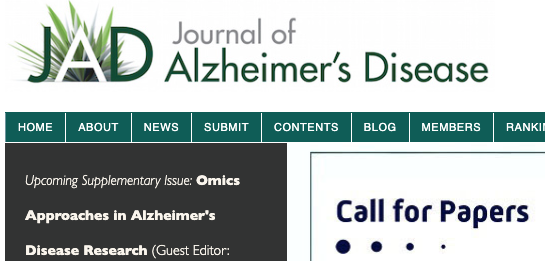Journal of Alzheimer's Disease
Empowering researchers to accelerate progress in science and medicine by leading a transformation in research communication.

Journal of Alzheimer's Disease

The Journal of Alzheimer’s Disease (JAD) is an international multidisciplinary journal to facilitate progress in understanding the etiology, pathogenesis, epidemiology, genetics, behavior, treatment and psychology of Alzheimer’s disease. The journal publishes research reports, reviews, short communications, hypotheses, ethics reviews, book reviews, and letters-to-the-editor. The journal is dedicated to providing an open forum for original research that will expedite our fundamental understanding of Alzheimer’s disease.

Volume 86, Number 1, 2022
A Proposed Brain-, Spine-, and Mental- Health Screening Methodology (NEUROSCREEN) for Healthcare Systems: Position of the Society for Brain Mapping and TherapeuticsPages 21-42
Abstract: The COVID-19 pandemic has accelerated neurological, mental health disorders, and neurocognitive issues. However, there is a lack of inexpensive and efficient brain evaluation and screening systems. As a result, a considerable fraction of patients with neurocognitive or psychobehavioral predicaments either do not get timely diagnosed or fail to receive personalized treatment plans. This is especially true in the elderly populations, wherein only 16% of seniors say they receive regular cognitive evaluations. Therefore, there is a great need for development of an optimized clinical brain screening workflow methodology like what is already in existence for prostate and breast exams. Such a methodology should be designed to facilitate objective early detection and cost-effective treatment of such disorders. In this paper we have reviewed the existing clinical protocols, recent technological advances and suggested reliable clinical workflows for brain screening. Such protocols range from questionnaires and smartphone apps to multi-modality brain mapping and advanced imaging where applicable. To that end, the Society for Brain Mapping and Therapeutics (SBMT) proposes the Brain, Spine and Mental Health Screening (NEUROSCREEN) as a multi-faceted approach. Beside other assessment tools, NEUROSCREEN employs smartphone guided cognitive assessments and quantitative electroencephalography (qEEG) as well as potential genetic testing for cognitive decline risk as inexpensive and effective screening tools to facilitate objective diagnosis, monitor disease progression, and guide personalized treatment interventions. Operationalizing NEUROSCREEN is expected to result in reduced healthcare costs and improving quality of life at national and later, global scales.

